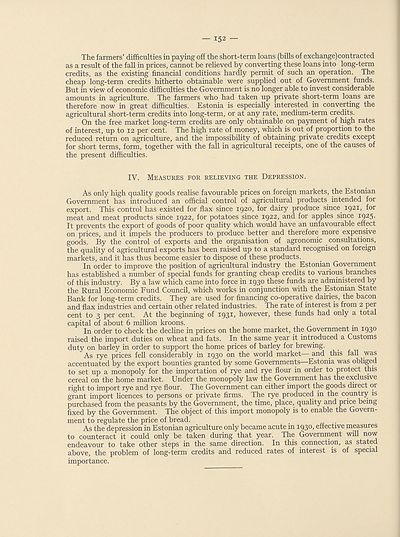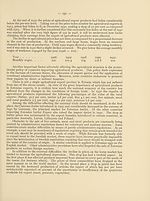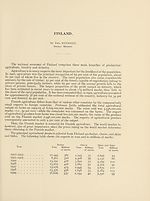Download files
Complete book:
Individual page:
Thumbnail gallery: Grid view | List view

— 152
The farmers’ difficulties in paying off the short-term loans (bills of exchange)contracted
as a result of the fall in prices, cannot be relieved by converting these loans into long-term
credits, as the existing financial conditions hardly permit of such an operation. The
cheap long-term credits hitherto obtainable were supplied out of Government funds.
But in view of economic difficulties the Government is no longer able to invest considerable
amounts in agriculture. The farmers who had taken up private short-term loans are
therefore now in great difficulties. Estonia is especially interested in converting the
agricultural short-term credits into long-term, or at any rate, medium-term credits.
On the free market long-term credits are only obtainable on payment of high rates
of interest, up to 12 per cent. The high rate of money, which is out of proportion to the
reduced return on agriculture, and the impossibility of obtaining private credits except
for short terms, form, together with the fall in agricultural receipts, one of the causes of
the present difficulties.
IV. Measures for relieving the Depression.
As only high quality goods realise favourable prices on foreign markets, the Estonian
Government has introduced an official control of agricultural products intended for
export. This control has existed for flax since 1920, for dairy produce since 1921, for
meat and meat products since 1922, for potatoes since 1922, and for apples since 1925.
It prevents the export of goods of poor quality which would have an unfavourable effect
on prices, and it impels the producers to produce better and therefore more expensive
goods. By the control of exports and the organisation of agronomic consultations,
the quality of agricultural exports has been raised up to a standard recognised on foreign
markets, and it has thus become easier to dispose of these products.
In order to improve the position of agricultural industry the Estonian Government
has established a number of special funds for granting cheap credits to various branches
of this industry. By a law which came into force in 193° these funds are administered by
the Rural Economic Fund Council, which works in conjunction with the Estonian State
Bank for long-term credits. They are used for financing co-operative dairies, the bacon
and flax industries and certain other related industries. The rate of interest is from 2 per
cent to 3 per cent. At the beginning of 1931, however, these funds had only a total
capital of about 6 million kroons.
In order to check the decline in prices on the home market, the Government m 1930
raised the import duties on wheat and fats. In the same year it introduced a Customs
duty on barley in order to support the home prices of barley for brewing.
As rye prices fell considerably in 1930 on the world market— and this fall was
accentuated by the export bounties granted by some Governments—Estonia was obliged
to set up a monopoly for the importation of rye and rye flour in order to protect this
cereal on the home market. Under the monopoly law the Government has the exclusive
right to import rye and rye flour. The Government can either import the goods direct or
grant import licences to persons or private firms. The rye produced in the country is
purchased from the peasants by the Government, the time, place, quality and price being
fixed by the Government. The object of this import monopoly is to enable the Govern¬
ment to regulate the price of bread.
As the depression in Estonian agriculture only became acute in 1930, effective measures
to counteract it could only be taken during that year. The Government will now
endeavour to take other steps in the same direction. In this connection, as stated
above, the problem of long-term credits and reduced rates of interest is of special
importance.
The farmers’ difficulties in paying off the short-term loans (bills of exchange)contracted
as a result of the fall in prices, cannot be relieved by converting these loans into long-term
credits, as the existing financial conditions hardly permit of such an operation. The
cheap long-term credits hitherto obtainable were supplied out of Government funds.
But in view of economic difficulties the Government is no longer able to invest considerable
amounts in agriculture. The farmers who had taken up private short-term loans are
therefore now in great difficulties. Estonia is especially interested in converting the
agricultural short-term credits into long-term, or at any rate, medium-term credits.
On the free market long-term credits are only obtainable on payment of high rates
of interest, up to 12 per cent. The high rate of money, which is out of proportion to the
reduced return on agriculture, and the impossibility of obtaining private credits except
for short terms, form, together with the fall in agricultural receipts, one of the causes of
the present difficulties.
IV. Measures for relieving the Depression.
As only high quality goods realise favourable prices on foreign markets, the Estonian
Government has introduced an official control of agricultural products intended for
export. This control has existed for flax since 1920, for dairy produce since 1921, for
meat and meat products since 1922, for potatoes since 1922, and for apples since 1925.
It prevents the export of goods of poor quality which would have an unfavourable effect
on prices, and it impels the producers to produce better and therefore more expensive
goods. By the control of exports and the organisation of agronomic consultations,
the quality of agricultural exports has been raised up to a standard recognised on foreign
markets, and it has thus become easier to dispose of these products.
In order to improve the position of agricultural industry the Estonian Government
has established a number of special funds for granting cheap credits to various branches
of this industry. By a law which came into force in 193° these funds are administered by
the Rural Economic Fund Council, which works in conjunction with the Estonian State
Bank for long-term credits. They are used for financing co-operative dairies, the bacon
and flax industries and certain other related industries. The rate of interest is from 2 per
cent to 3 per cent. At the beginning of 1931, however, these funds had only a total
capital of about 6 million kroons.
In order to check the decline in prices on the home market, the Government m 1930
raised the import duties on wheat and fats. In the same year it introduced a Customs
duty on barley in order to support the home prices of barley for brewing.
As rye prices fell considerably in 1930 on the world market— and this fall was
accentuated by the export bounties granted by some Governments—Estonia was obliged
to set up a monopoly for the importation of rye and rye flour in order to protect this
cereal on the home market. Under the monopoly law the Government has the exclusive
right to import rye and rye flour. The Government can either import the goods direct or
grant import licences to persons or private firms. The rye produced in the country is
purchased from the peasants by the Government, the time, place, quality and price being
fixed by the Government. The object of this import monopoly is to enable the Govern¬
ment to regulate the price of bread.
As the depression in Estonian agriculture only became acute in 1930, effective measures
to counteract it could only be taken during that year. The Government will now
endeavour to take other steps in the same direction. In this connection, as stated
above, the problem of long-term credits and reduced rates of interest is of special
importance.
Set display mode to:
![]() Universal Viewer |
Universal Viewer | ![]() Mirador |
Large image | Transcription
Mirador |
Large image | Transcription
Images and transcriptions on this page, including medium image downloads, may be used under the Creative Commons Attribution 4.0 International Licence unless otherwise stated. ![]()
| League of Nations > Economic and financial section > Agricultural crisis > Volume 1 > (154) |
|---|
| Permanent URL | https://digital.nls.uk/190904652 |
|---|
| Shelfmark | LN.II.2/2.(35) |
|---|---|
| Attribution and copyright: |
|
| Shelfmark | LN.II.2/2.(35-35) |
|---|---|
| Shelfmark | LN.II |
|---|
| Description | Over 1,200 documents from the non-political organs of the League of Nations that dealt with health, disarmament, economic and financial matters for the duration of the League (1919-1945). Also online are statistical bulletins, essential facts, and an overview of the League by the first Secretary General, Sir Eric Drummond. These items are part of the Official Publications collection at the National Library of Scotland. |
|---|---|
| Additional NLS resources: |
|

